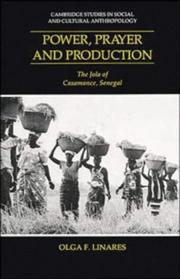| Listing 1 - 4 of 4 |
Sort by
|
Book
ISBN: 3515043551 Year: 1985 Volume: vol 78 Publisher: Wiesbaden Stuttgart Steiner
Abstract | Keywords | Export | Availability | Bookmark
 Loading...
Loading...Choose an application
- Reference Manager
- EndNote
- RefWorks (Direct export to RefWorks)
Diola (African people) --- History. --- Dyamate (African people) --- Dyola (Senegalese and Gambian people) --- Jola (African people) --- Kudamata (African people) --- Kujamatak (African people) --- Yola (Senegalese and Gambian people) --- Ethnology --- History --- Casamance (Senegal) --- Casamance, Senegal --- Région de Casamance (Senegal) --- Kolda (Senegal : Region) --- Ziguinchor (Senegal : Region) --- Casamance. Histoire. --- Casamance. Geschiedenis.
Book
Year: 1988 Publisher: Lisboa : Centro de Estudos de História e Cartografia Antiga,
Abstract | Keywords | Export | Availability | Bookmark
 Loading...
Loading...Choose an application
- Reference Manager
- EndNote
- RefWorks (Direct export to RefWorks)
France --- Guinea-Bissau --- Guinea-Bissau --- Kolda (Senegal : Region) --- Portugal --- Ziguinchor (Senegal : Region) --- Guinea-Bissau --- France --- Guinée-Bissau --- Guinée-Bissau --- Kolda (Sénégal : Région administrative) --- Portugal --- Ziguinchor (Sénégal : Région administrative) --- Guinée-Bissau --- Foreign relations --- Boundaries --- Boundaries --- Boundaries --- Foreign relations --- Boundaries --- History --- Relations extérieures --- Frontières --- Frontières --- Frontières --- Relations extérieures --- Frontières --- Histoire

ISBN: 0521401321 0521040353 0511557647 051187863X Year: 1992 Volume: 82 Publisher: Cambridge : Cambridge University Press,
Abstract | Keywords | Export | Availability | Bookmark
 Loading...
Loading...Choose an application
- Reference Manager
- EndNote
- RefWorks (Direct export to RefWorks)
The Jola (Diola) are intensive wet-rice cultivators in the Lower Casamance region of Senegal. In this study, the author examines the reasons behind startling contrasts in the organization of agricultural tasks among three Jola communities located within a 45-kilometre radius from Ziguinchor. In Sambujat, situated in the non-Islamisized region south of the river, wet rice is a monocrop cultivated by both men and women. In Jipalom, in the Kajamutay region north of the river, Islam and cash cropping have been adopted; and in Fatiya, in the so-called 'Mandingized' region of the Kalunay, social relations have become hierarchical and this has had profound effects on the cropping system and on the division of labour. The author examines the shift of power relations over time, and their effects on the way in which production has been organized by age and gender, kin and class. Larger issues dealt with are Islamization, women's labour and the introduction of cash cropping. A concluding section places the history of Jola labour relations within the context of the political economy of Senegal.
Diola (African people) --- Rice --- Diola (Peuple d'Afrique) --- Agriculture. --- Economic conditions. --- Politics and government. --- Conditions économiques --- Casamance (Senegal) --- Casamance (Sénégal) --- Social conditions. --- Religious life and customs. --- Conditions sociales --- Conditions économiques --- Casamance (Sénégal) --- Arts and Humanities --- Philosophy --- Dyamate (African people) --- Dyola (Senegalese and Gambian people) --- Jola (African people) --- Kudamata (African people) --- Kujamatak (African people) --- Yola (Senegalese and Gambian people) --- Ethnology --- Lowland paddy --- Lowland rice --- Oryza sativa --- Paddy (Plant) --- Padi --- Palay --- Oryza --- Casamance, Senegal --- Région de Casamance (Senegal) --- Kolda (Senegal : Region) --- Ziguinchor (Senegal : Region)
Book
ISBN: 0748670645 0748633219 0748633197 Year: 2007 Publisher: Edinburgh : Edinburgh University Press,
Abstract | Keywords | Export | Availability | Bookmark
 Loading...
Loading...Choose an application
- Reference Manager
- EndNote
- RefWorks (Direct export to RefWorks)
How do those on the margins of modernity face the challenges of globalization? This book demonstrates that secrecy is one of the means by which a society on the fringe of modernity produces itself as locality. Focusing on initiation rituals, masked performances and modern art, this study shows that rituals and performances long deemed obsolete, serve the insertion of their performers in the world at their own terms. The Jola and Mandinko people of the Casamance region in Senegal have always used their rituals and performances to incorporate the impact of Islam, colonialism, capitalism, and contemporary politics. Their performances of secrecy have accommodated these modern powers and continue to do so today. The performers incorporate the modern and redefine modernity through secretive practices. Their traditions are not modern inventions, but traditional ways of dealing with modernity. This book will interest anthropologists, historians, political scientists and all those studying how globalisation affects peripheral societies. It shows that secrecy, performed as a weapon of the weak, empowers their performers. Secrecy serves to mark boundaries and define the local in the global.
Secrecy --- Rites and ceremonies --- Group identity --- Ethnology --- Globalization. --- Concealment --- Privacy --- Hiding places --- Global cities --- Globalisation --- Internationalization --- International relations --- Anti-globalization movement --- Cultural anthropology --- Ethnography --- Races of man --- Social anthropology --- Anthropology --- Human beings --- Collective identity --- Community identity --- Cultural identity --- Social identity --- Identity (Psychology) --- Social psychology --- Collective memory --- Ceremonies --- Cult --- Cultus --- Ecclesiastical rites and ceremonies --- Religious ceremonies --- Religious rites --- Rites of passage --- Traditions --- Ritualism --- Manners and customs --- Mysteries, Religious --- Ritual --- Casamance (Senegal) --- Casamance, Senegal --- Région de Casamance (Senegal) --- Kolda (Senegal : Region) --- Ziguinchor (Senegal : Region) --- Social life and customs. --- Religious life and customs. --- Culture and globalization. --- Globalization and culture --- Globalization
| Listing 1 - 4 of 4 |
Sort by
|

 Search
Search Feedback
Feedback About UniCat
About UniCat  Help
Help News
News